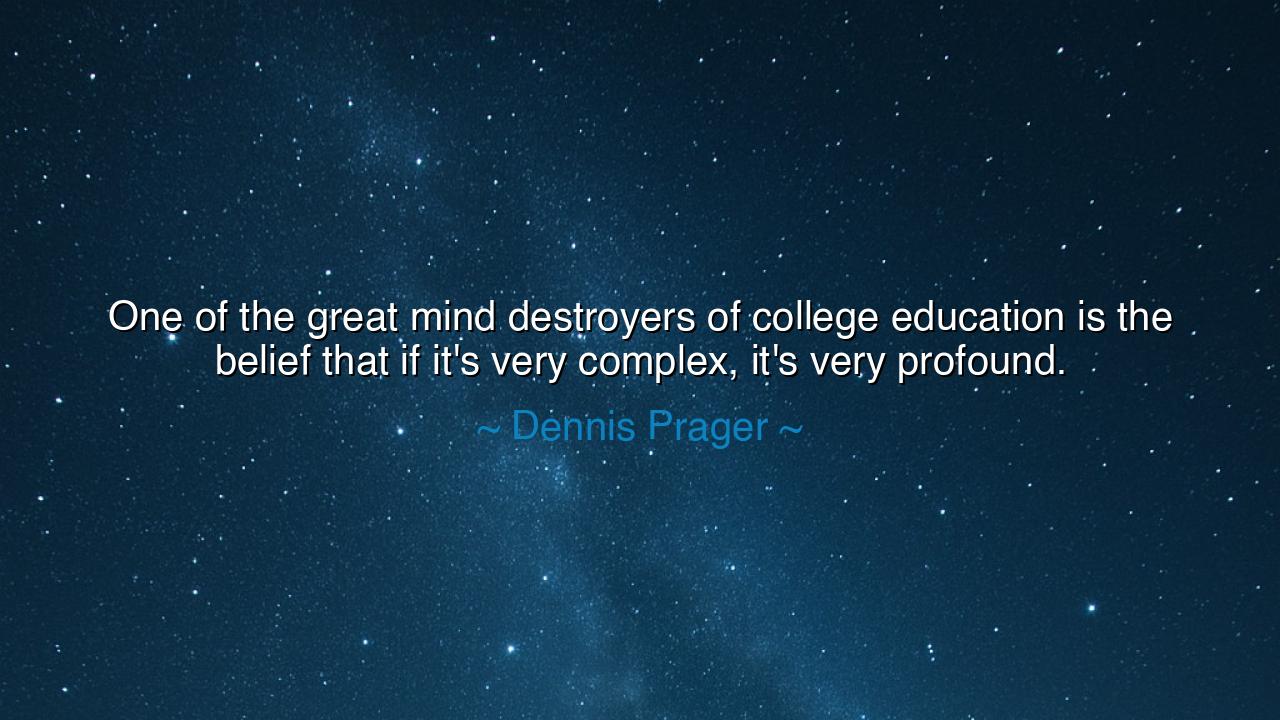
One of the great mind destroyers of college education is the
One of the great mind destroyers of college education is the belief that if it's very complex, it's very profound.






Hear the words of Dennis Prager, who spoke with clarity about the dangers of false wisdom: “One of the great mind destroyers of college education is the belief that if it’s very complex, it’s very profound.” In these words lies a warning for seekers of knowledge: that complexity alone does not equal truth, and obscurity does not equal depth. For the true test of wisdom is not how tangled it appears, but how much light it brings to the mind and how much strength it gives to the soul.
The ancients knew this well. Socrates, greatest of teachers, spoke not in lofty riddles but in simple questions, questions so clear they pierced through the fog of illusion. His greatness lay not in making ideas more complex, but in revealing truth in the plainest form. Plato wrote that the highest truths are those that speak directly to the human heart, without need for ornament or confusion. Prager echoes this timeless truth: to equate complexity with profundity is to risk exchanging clarity for vanity.
History gives us sharp examples of this error. In the Middle Ages, scholars often drowned their students in endless disputations, crafting intricate arguments about how many angels might stand upon a pin. Their words were heavy with complexity, but barren of meaning. Meanwhile, a simple truth—such as the law of gravity or the dignity of human life—could shape entire civilizations. The lesson is plain: it is not the tangled that endures, but the clear and true.
Prager also speaks of the danger this belief poses to the mind itself. When young students are trained to admire only what is difficult to understand, they become slaves to jargon and prisoners of confusion. They may mistake their inability to grasp an idea as evidence of its greatness, when in fact it may be only muddled thinking or empty pretension. Thus, instead of being liberated by education, their minds are destroyed—taught to worship shadows instead of light.
Yet simplicity is not to be confused with shallowness. To speak simply of great things requires more wisdom than to speak in endless circles. Jesus taught in parables of seeds and sheep, yet his words still move nations. The Buddha spoke of suffering and the path to its end in terms any common man could grasp. Their truths were not diminished by their simplicity; rather, their simplicity revealed their power. So too, true profundity shines most when it can be spoken plainly.
The lesson for us, O seeker, is clear: when you study, do not be dazzled by complexity for its own sake. Ask always: does this idea bring understanding? Does it bring truth? Does it bring strength for life? Do not mistake the tangled for the deep, nor the obscure for the wise. Seek instead that clarity which awakens the mind and nourishes the spirit. For it is better to hold one simple truth that guides your life than a thousand complicated notions that lead you nowhere.
Thus, let Dennis Prager’s words endure as a beacon for all students and teachers: true education is not in making things harder than they are, but in bringing the eternal truths to light. Complexity without clarity is vanity; simplicity with truth is greatness. Therefore, walk the path of learning with discernment, and remember always that the mark of real wisdom is not how difficult it is to say, but how powerfully it can be lived.






AAdministratorAdministrator
Welcome, honored guests. Please leave a comment, we will respond soon